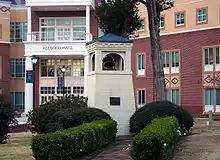Augusta University
Augusta University is a public university and academic medical center in Augusta, Georgia. It is a part of the University System of Georgia and has satellite medical campuses in Savannah, Albany, Rome, and Athens. It employs over 15,000 people, has more than 56,000 alumni,[6] and is accredited by the Southern Association of Colleges and Schools.
 | |
Former names | Georgia Regents University, Georgia Regents University Augusta. As Georgia Health Sciences University: Medical Academy of Georgia, Medical Institute of Georgia, Medical College of Georgia. As Augusta State University: Augusta Junior College, Augusta College, Academy of Richmond County |
|---|---|
| Type | Public university |
| Established | 1828[1] |
Parent institution | University System of Georgia |
| Endowment | $364.8 million[2][3] |
| President | Brooks Keel |
Academic staff | 1,643 |
Administrative staff | 3,500+ |
| Students | 9,274 (Fall 2019)[4] |
| Undergraduates | 5,604 (Fall 2019) |
| Postgraduates | 1,749 (Fall 2019) |
| 1,297 (Fall 2019) | |
Other students | 624 (Fall 2019) |
| Location | , , United States |
| Campus | Urban |
| Colors | Blue and gray |
| Nickname | Jaguars[5] |
| Website | www |
The Augusta University Health System includes the 478-bed Augusta University Medical Center, the 154-bed Children's Hospital of Georgia,[7] and more than 80 outpatient clinics.
Campus
Augusta University's main campus in Augusta, Georgia, encompasses more than 200 acres and has four local campuses. It is made up of the former campuses between Augusta State University and Georgia Health Sciences University, with additions from the University System of Georgia Board of Regents.[8]
Health Sciences
The medical college of the university, its oldest and founding college, began as the Medical Academy of Georgia in 1828, moving into the now historic Old Medical College Building in 1835. The present Health Sciences campus was formed in 1913 as the college moved to the Newton building and expanded from there, with the Dugas Building in 1937 marking the earliest building currently on the campus. The first clinical facility opened as the Eugene Talmadge Memorial Hospital in 1956.[9]

Located in Augusta's Medical District, the Health Sciences campus features all medical programs of the university, as well as the Health Sciences Building, Interdisciplinary Research Building, Wellness Center, Cancer Center, Medical College of Georgia, and Dental College of Georgia.
The Health Sciences campus also contains the Augusta University Medical Center, the Children's Hospital of Georgia, and Augusta University's two residence halls, Oak Hall and Elm Hall, which opened in Fall 2016.
Summerville

The Summerville campus was originally used as a United States Army arsenal, established in downtown Augusta in 1816 and relocated to the campus in 1827. By the turn of the twentieth century, the arsenal's prominence waned, beginning with the Spanish–American War in that the arsenal produced manufacturing equipment, seacoast targets, and was a repair station. In World War I, the station repaired rifles and small arms, but produced ordnance material and fire control operations for World War II.[10]
In 1955, the arsenal was closed, and two years later the land was given to the local Board of Education, which used it to open the Junior College of Augusta. In 1958, the name changed to Augusta College, and in 1996 to Augusta State University.
.jpg.webp)
Located on Walton Way, the Summerville campus houses many of the undergraduate programs and the Jaguar Student Activities Center. The Maxwell Performing Arts Theatre, the History Walk, the Mary S. Byrd Gallery of Art, The Honors Program, and the Maxwell Alumni House are all found on this campus. In addition, the James M. Hull College of Business, College of Education, College of Science and Mathematics, and Pamplin College of Arts, Humanities, and Social Sciences are located here.

The campus was formerly well known for the Arsenal Oak, a tree that contained wood believed to be 250–400 years old, until it was cut down in June 2004 because of disease.[11] A dedication ceremony of the replanting of the new Arsenal Oak took place on Friday, April 29, 2016, on the front lawn of the Benét House.[12] The descendant was grown from an acorn of the original Arsenal Oak.[13]
Forest Hills

Then-Augusta State University opened a second campus in 1991 for athletics, complete with a 3,800-seat arena—Christenberry Fieldhouse, named in 2003—and softball and baseball fields.[10] The J. Fleming Norvell Golf House was added in 2007 with an adjacent driving range, putting green, and chipping area.[14]
The campus contains Forest Hills Golf Club, home of the men's and women's golf teams and a public course available for play, and the 500-bed University Village student housing.
The Nathan Deal Campus for Innovation
The former Georgia Golf Hall of Fame riverfront property in Downtown Augusta has been developed to house the Augusta University Cyber Institute[15] and the Georgia Cyber Innovation and Training Center which opened in July 2018.[16] The Riverfront Campus was named in honor of Georgia Governor Nathan Deal who was on hand for the opening ceremony of the Hull-McKnight Building on the campus. A second cyber building will open in December 2018 with potential plans to expand more on the property.
Partnerships
UGA–MCG medical partnership
The College of Nursing has a satellite campus in Athens. AU's Medical College of Georgia (MCG) operates a partnership with the University of Georgia on the University of Georgia's new Health Sciences Campus, also in Athens.
In 2010, MCG partnered with the University of Georgia (UGA) to create the UGA-MCG Medical Partnership. The Medical Partnership combines the experience of one of the nation's first medical schools with the resources of one of the nation's most comprehensive leading nationally ranked research universities. The result is an education that allows medical students to reach their full potential in a unique and stimulating learning environment. [17]
To accommodate its new Health Sciences Campus, in 2011 the University of Georgia acquired the 58-acre former U.S. Navy Supply Corps School which had extensive landscaped green spaces, more than 400 trees, and several historic buildings located on the hospital and medical office corridor of Prince Avenue near downtown Athens. After renovations and additions, in July 2012, the UGA-MCG Medical Partnership moved to the new University of Georgia Health Sciences Campus.
ECRH–AU medical partnership
East Central Regional Hospital contains two locations in Augusta and Gracewood, was taken over by GRU for administrative purposes in 2009 after the facility was considered for closure. The university's College of Nursing is actively involved in the daily activities, including patient care. The hospital specializes in behavioral health and mental disabilities.[18]
US Army Cyber Center of Excellence at Fort Gordon–AU Cyber Institute partnership
Fort Gordon is home to the US Army Cyber Center of Excellence and the US Army Cyber Command. The partnership will strengthen the relationship between AU and ARCYBER by assisting soldiers transferring their training to the private sector as well as by sharing resources.[19] The ribbon-cutting and opening ceremony of Augusta University's Cyber Institute took place in University Hall on the Summerville campus on Friday, September 16, 2016.[20]
East Georgia State College Augusta
In 2013, East Georgia State College (EGSC), a University System of Georgia institution based in the rural city of Swainsboro, began a collaboration with AU to serve Augusta-area students who do not meet AU's freshman admission requirements. Students enrolled in the program are enrolled as EGSC students and attend classes on the Summerville Campus. After completing 30 semester hours of college level coursework and attaining a minimum GPA of 2.3, students can then elect to transfer into a bachelor's program at AU. This collaboration is modeled after EGSC's long-standing collaboration with Georgia Southern University and replaces the former "University College" program.[21]
Athletics
Augusta competes at the NCAA Division I level in women's and men's golf and is a Division II participant in its 11 other sports (women's and men's cross country, women's volleyball, women's and men's basketball, women's and men's tennis, softball, baseball and women's and men's outdoor track & field). The mascot is the Jaguar.
The men's golf program captured the school's first NCAA Division I Men's Golf National Championship on June 6, 2010 in Ooltewah, Tennessee, when the Jaguars defeated Oklahoma State University. The Jags then became the first Division I men's golf program in 27 years to repeat as National Champions on June 5, 2011 when they defeated the University of Georgia at Karsten Creek Golf Club in Stillwater, Oklahoma.[22]
Notable alumni and faculty
Notable alumni and faculty of Augusta University's predecessor institutions include:
- Doug Barnard, Jr., Congressman
- Chen Be-yue, Justice of the Constitutional Court of the Republic of China
- John Britton, former professor, murdered by anti-abortion extremist in 1994
- Paul Broun, Congressman
- Joelle Carter, actress
- Edward J. Cashin, American historian; Professor emeritus of History; Director of the Center for the Study of Georgia History
- Hervey M. Cleckley, co-author of the book The Three Faces of Eve
- Judith Ortiz Cofer, author
- Leila Denmark, pediatrician and medical researcher; co-developer of the pertussis vaccine
- Michael T. Dugan, accounting academic; Professor of Accounting at Augusta University
- Phil Gingrey, Congressman
- Isaac S. Hopkins, first President of Georgia Institute of Technology
- Anthony Kellman, Professor of English and Creative Writing; poet, novelist and musician
- Darrell Kirch, AAMC president
- Marguerite Littleton Kearney, director, Division of Extramural Science Programs, National Institute of Nursing Research[23]
- Michael Patrick Mulroy,[24][25] Deputy Assistant Secretary of Defense for Secretary James Mattis
- Matthew L. Nathan,[26] 37th Surgeon General of the United States Navy
- Dr. No-Hee Park, Dean, UCLA School of Dentistry and notable researcher of oral (head and neck) cancer and aging research[27]
- Patrick Reed,[28] PGA Tour golfer
- Garret Siler, former NBA basketball player, currently holds the NCAA record for field goal percentage
- Ed Tarver, United States Attorney
- Corbett H. Thigpen, co-author of the book The Three Faces of Eve
See also
- History of Augusta University
- Old Medical College
- Medical College of Georgia
- Augusta University Medical Center
- UGA–AU medical partnership
- Medical District (Augusta, Georgia)
- Stephen Vincent Benet House
- List of medical schools in the United States
- List of nursing schools in the United States
- List of dental schools in the United States
References
- "About August University". Retrieved March 29, 2016.
- As of 2019medical+2009undergrad. "U.S. and Canadian Institutions Listed by Fiscal Year 2011 Endowment Market Value and Percentage Change in Endowment Market Value from FY 2010 to FY 2011 (Table Revised and Updated on March 19, 2012)" (PDF). 2009 NACUBO-Commonfund Study of Endowments. National Association of College and University Business Officers. Archived from the original (PDF) on September 15, 2012. Retrieved March 4, 2010.
- As of June 30, 2019. "U.S. and Canadian 2019 NTSE Participating Institutions Listed by Fiscal Year 2019 Endowment Market Value, and Percentage Change in Market Value from FY18 to FY19 (Revised)". National Association of College and University Business Officers and TIAA. Retrieved September 19, 2020.
- https://www.augusta.edu/ie/ir/facts/enrollment.php
- "jaguarsroar.com". Retrieved January 24, 2013.
- "Fast Facts". www.augusta.edu.
- "Children's Hospital of Georgia".
- "GRU Augusta site names approved". Archived from the original on March 19, 2014. Retrieved January 25, 2013.
- "GHSU History". Archived from the original on March 20, 2013. Retrieved February 25, 2013.
- "Augusta State University history". Archived from the original on March 8, 2012.
- "End Near for Augusta's historic Arsenal Oak". Associated Press. Archived from the original on March 4, 2016. Retrieved February 25, 2013.
- "Augusta University dedicates new Arsenal Oak Friday". JagWire.
- "New Arsenal Oak takes root on Summerville Campus". JagWire.
- "ASU Press Release". Archived from the original on May 28, 2010. Retrieved February 25, 2013.
- "Augusta University Cyber Institute".
- "Work starts on Georgia Cyber Innovation and Training Center prior to Monday groundbreaking".
- "UGA-GHSU Partnership". UGA-GHSU Partnership. Retrieved November 19, 2012.
- "East Central Regional Hospital and Georgia Health Sciences University Partnership". Archived from the original on January 29, 2013. Retrieved February 25, 2013.
- "Cyber Center at Fort Gordon and Augusta University Collaborate on Cyber Security".
- "New Cyber Institute opens". The Bell Ringer.
- "EGSC-A Frequently Asked Questions". Augusta University. Retrieved April 9, 2017.
- Balicki, Ron. "Augusta St. tops Georgia, repeats as NCAA Champ".
- "Kearney Named Distinguished Alumna at Augusta University | National Institute of Nursing Research". National Institute of Nursing Research. May 11, 2017. Retrieved February 12, 2020.
- "Michael (Mick) P. Mulroy > U.S. DEPARTMENT OF DEFENSE > Biography View". dod.defense.gov.
- "Senior Executive Service Announcements". U.S. DEPARTMENT OF DEFENSE.
- "Archived copy". Archived from the original on January 20, 2018. Retrieved January 20, 2018.CS1 maint: archived copy as title (link)
- David Geffen School of Medicine at UCLA
- "Patrick Reed". Augusta University.
External links
| Wikimedia Commons has media related to Augusta University. |

